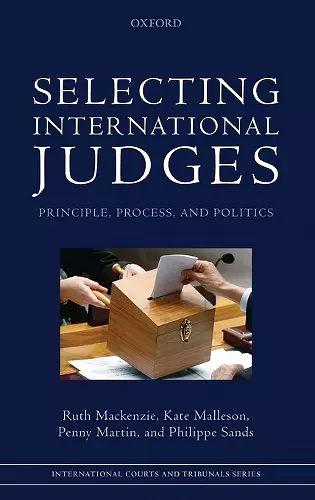Selecting International Judges
Principle, Process, and Politics
Penny Martin author Kate Malleson author Ruth Mackenzie author Philippe Sands QC author
Format:Hardback
Publisher:Oxford University Press
Published:17th Jun '10
Currently unavailable, and unfortunately no date known when it will be back

This book examines the way international court judges are chosen. Focusing principally on the judicial selection procedures of the International Court of Justice and International Criminal Court, it provides the first detailed examination of how the selection process works in practice at national and international levels: what factors determine whether a state will nominate a candidate? How is a candidate identified? What factors influence success or failure? What are the respective roles of merit, politics, and other considerations in the nomination and election process? The research was based on interviews, case studies and survey data in a range of different states. It concludes that although the nature and quality of nomination and election processes vary widely, a common theme indicates the powerful influence of domestic and international political considerations, and the significant role of a small group of diplomats, civil servants, lawyers, and academics, often without transparency or accountability. The processes allow overt political considerations to be introduced throughout the decision-making process in ways that may detract from the selection of the most highly qualified candidates and, ultimately, undermine independence. This is particularly evident in the election campaigning that has become a defining feature of the selection process, accompanied by widespread vote trading and reciprocal agreements between states. The effect of these practices is often to undermine the role of statutory selection criteria and to favour candidates from more politically powerful states. The book reviews new judicial selection models adopted or proposed in other international and regional courts, and considers a number of proposals for change to promote more independent, transparent, and merit-based nomination and election procedures.
The results of the study are based on an innovative quantitative and qualitative analysis of the nomination and election processes of international courts, focusing on the International Court of Justice (ICJ) and the International Criminal Court (ICC). * Kai Ambos, Criminal Law Forum *
Ruth Mackenzie, Kate Malleson, Penny Martin, and Philippe Sands build their case here that, in addition to being a detached and scholarly treatise, theirs is also something of a multicount indictment of the existing modus operandi for selecting international judges, as well as a civilized call to competely rethink how the process of selection should work * Edward Gordon, International Law Association *
...the value of the book lies in the honesty and openness of the interviewees. The anonymous nature of the interviews contributes to the credibility of the information obtained through the interviews...succeeds in revealing and probing the multitude of tensions informing the selection process - the tensions between civil law and common law, national law and international law, East and West, South and North, to name but a few. * Mia Swart, The Leiden Journal of International Law *
ISBN: 9780199580569
Dimensions: 241mm x 162mm x 25mm
Weight: 544g
256 pages